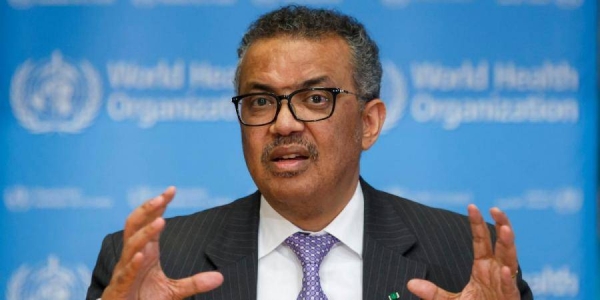By Muhammad Amaan
The World Health Organisation (WHO) said more than 18,000 suspected cases of Mpox have been reported in the Democratic Republic of Congo (DRC) this year, with 629 deaths.
Director-General of WHO, Dr Tedros Ghebreyesus, disclosed this on Friday during an online news conference.
He said that the cases included more than 5000 cases and 31 deaths from the eastern provinces of North and South Kivu, where the new clade 1b strain had been spreading.
“The number of reported cases of clade 1b has been rising rapidly for several weeks. Fortunately, relatively few deaths have been reported in recent weeks.”
According to him, in addition, 258 cases of clade 1b have been confirmed in Burundi, four in Rwanda, four in Uganda, one in Kenya and one each in Sweden and Thailand.
“We also remain concerned about outbreaks of clade 1a in other parts of DRC.
“This morning, I returned from DRC, where yesterday I had the honour to meet with His Excellency President Félix Tshisekedi to discuss the outbreaks.
“I thanked the president for his leadership in the response to the outbreaks, demonstrated by the government’s commitment of $10 to the response.
I assured him of WHO’s full support, together with the Africa CDC and other partners,” he said.
Dr Ghebreyesus said he also had the opportunity to meet with the UN Country Team, where they discussed coordination of the Mpox response among UN agencies, under the government’s leadership.
He that they discussed the critical importance of clear communication with people at risk of Mpox and strong engagement with communities and local partners.
“I also met with global and local health partners to discuss scaling up routine immunisation for other diseases, including polio, measles and malaria, and mobilising frontline polio workers to support the Mpox response.
“WHO is working to accelerate access to and delivery of vaccines.
“The manufacturers of the two vaccines submitted their applications for emergency use listing last Friday and we are working to review those applications as fast as possible.
“The safety and efficacy of vaccines are our highest priority. We will not take short cuts.”
According to him, the two main buyers of vaccines for low-income countries, Gavi and UNICEF, require WHO emergency use listing to buy vaccines for use in countries that have not issued their own national regulatory approval.
“Last week, I gave Gavi and UNICEF the green light to proceed with procuring vaccines, in parallel with the EUL process.
“However, WHO emergency use listing is not a barrier to vaccines being deployed in DRC.”
The director-general said that DRC’s medicines regulator approved both vaccines in June and the government had requested bilateral donations of vaccines from high-income countries with large stockpiles.
He said that together with the Africa CDC, WHO had also helped to secure donations from the European Union and some of its Member States.
“WHO is working with the Africa CDC, GAVI, UNICEF, CEPI and HERA to set up a coordination mechanism to allocate the donated vaccines and increase access in affected countries.
“On Thursday, we also invited manufacturers of Mpox diagnostics to submit an expression of interest for emergency use listing.”
The WHO boss said that on Friday, the first expression of interest was received.
“Over the past two days, we have also convened a meeting of researchers to identify research priorities and to foster a coordinated and collaborative approach to the development of vaccines, diagnostics and therapeutics.
“It is vital to stress that although vaccines are a powerful tool, they are far from the only tool.
“There are many things that WHO and our partners are doing to prevent and diagnose infections and treat the sick.”
According to him, the outbreak of clade 1b Mpox is occurring in one of the poorest and most insecure regions of DRC, complicating the response.
“Despite these challenges, hundreds of WHO personnel are on the ground in DRC and the other affected countries, working with our partners to stop transmission and bring these outbreaks under control.
“With the government’s leadership and close cooperation between partners, we believe we can stop these outbreaks in the next six months.
“But what this region of DRC needs more than anything else is a political solution to the long-running insecurity,” Ghebreyesus said.




